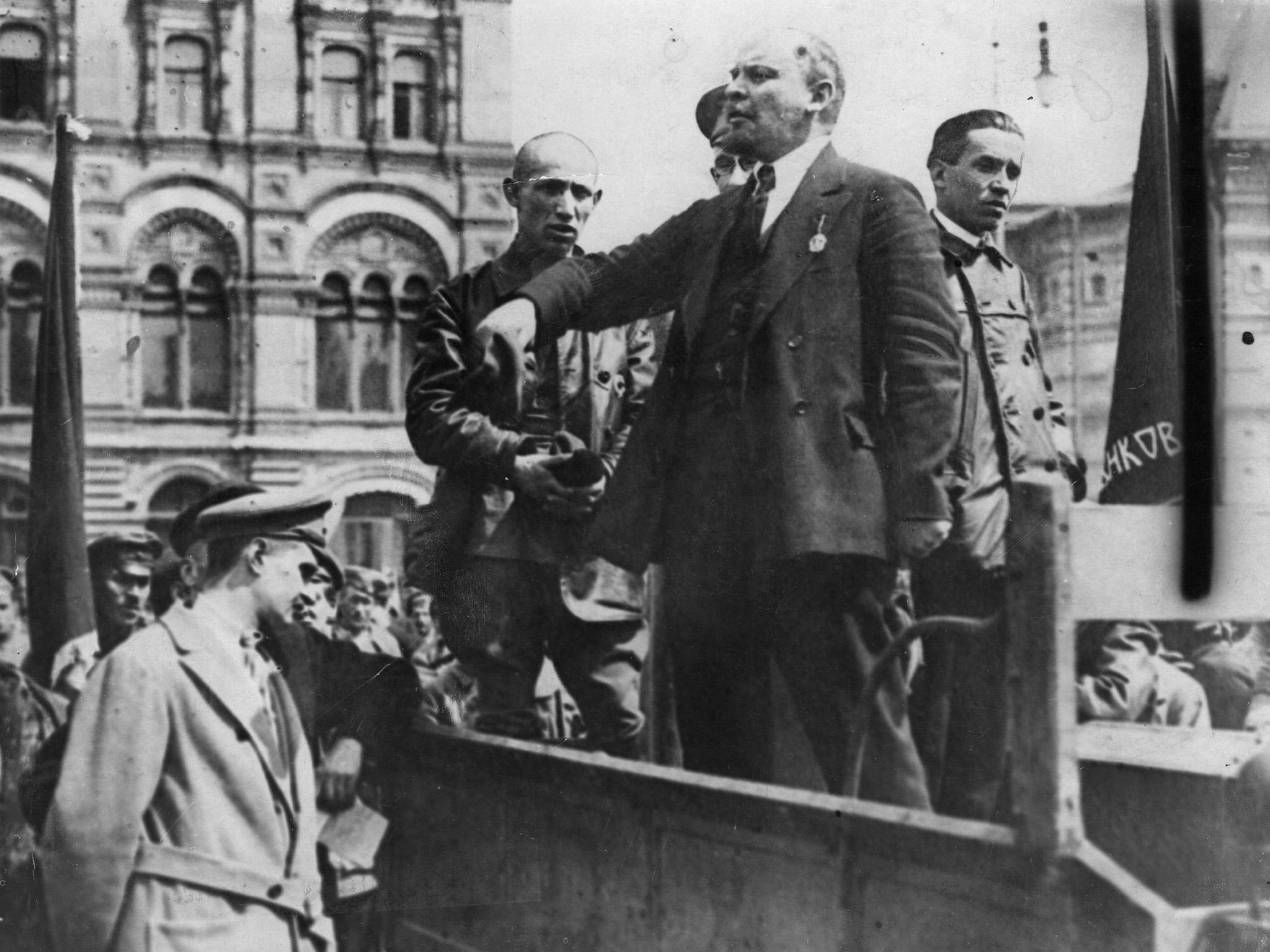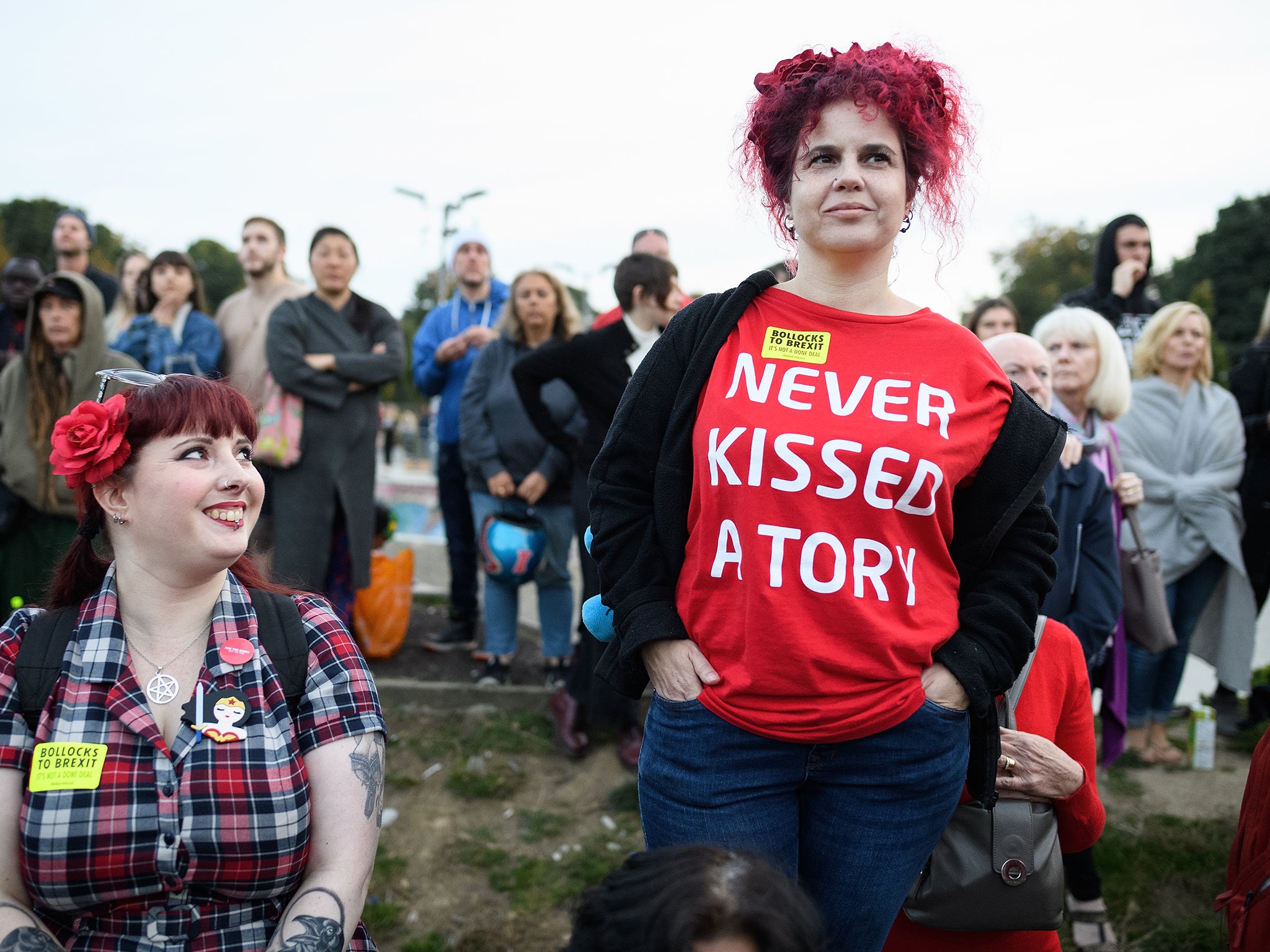The Independent's journalism is supported by our readers. When you purchase through links on our site, we may earn commission.
100 years on from the Russian Revolution, could a 21st century revolt bring about the end of capitalism?
Since 1917, countless social movements have taken their cue from this momentous uprising, and its lasting impact on the world may yet to be felt fully

The centenary of the Russian Revolution comes at a strange moment. It is not being officially marked let alone celebrated in Putin’s Russia. The collapse and demise of communism in 1991 appears to have consigned it ironically to what Trotsky termed the dustbin of history.
The Russian Revolution has had a bad press in the West. And that is putting it mildly. Its leaders – Lenin, then Stalin – are often equated with Hitler as mass murderers who oversaw totalitarian regimes. The left was eventually forced to concede that the revolution transmuted into an autocratic regime embodied in the purges and gulags under Stalin. The victors, as they say, write the history books.
However, it is apparent that a selective amnesia is in operation. Stalin’s victims are remembered but not King Leopold’s in the Belgian Congo. Similarly, the crimes of the US empire – millions killed in the Korean, Vietnam and Iraq wars – are rarely mentioned in the same breath. As US general Curtis LeMay said of the Second World War: “I suppose if I had lost the war, I would have been tried as a war criminal.”
Yet it is important to separate out the legacy of Stalinism from the initial revolutionary moment. In one fell swoop, 1917 represented the sweeping away of centuries of Tsarism for millions of Russian serfs. Whilst Britain and France had undergone bourgeois and industrial capitalist revolutions from the 17th and 18th centuries onwards, Russia was a sleeping giant of agrarian feudalism.
The fervour was immortalised in Trotsky’s towering The History of the Russian Revolution and the American journalist John Reed’s Ten Days that Shook the World. Even Hollywood would celebrate this world-historical force of liberation in Warren Beatty’s Oscar-winning 1981 adaptation of Reed’s life Reds with an all-star cast that included Jack Nicholson and Diane Keaton, with Beatty in the lead role of Reed, of course.

The Bolshevik victory immediately faced the counter-revolution internally and externally in common with all revolutions. A civil war erupted with the ancien régime backed by major world powers including Britain, France and the US. A critical question is how a revolution navigates these dangers without becoming authoritarian and betraying its ideals. Progressive movements that have attempted democratic revolutions – for example, Allende in Chile or more recently the Egyptian uprising of 2011 – have been brutally defeated by counter-revolutionary forces.
The literature on the Russian revolution is overwhelming. The centenary has seen a flurry of books published by luminaries of the left including Tariq Ali’s The Dilemmas of Lenin, Neil Faulkner’s A People’s History of the Russian Revolution, China Miéville’s October and Slavoj Zizek’s edited Lenin 2017.
The Dilemmas of Lenin is preoccupied with the necessary conditions for revolution and how it can succeed against all odds. Faulkner’s book, meanwhile, is a potted history of the revolution, myth-busting many of the preconceptions around the early period. The collapse of communism was a quarter of a century ago – so what is their assessment of the Russian Revolution 100 years on?
Faulkner (whose acquaintance I have recently made) emphasises that it is necessary to “correct the popular understanding that what collapsed was communism in the sense of a radical political alternative”. He says: “What the term comes to mean is a political dictatorship presiding over a state capitalist economy. The Russian Revolution as an attempt to transform the world and create socialism or communism in its original meaning was defeated in the 1920s. The mass working-class democracy which had created it was destroyed.”
Tariq Ali replies: “It was a necessary social revolution that toppled the Tsarist autocracy in February and capitalism in November.” He adds that “the creation of the Red Army that survived Stalin’s purges went on to destroy the spinal cord of the Third Reich at Kursk and Stalingrad. Private Ivan, not Private Ryan won the Second World War. This should never be forgotten.” Indeed, three quarters of the German Wehrmacht’s losses were on the eastern front fighting the Soviets.
The conditions forging the golden age of post-war capitalism were highly unusual. In the wake of the Great Depression, the Glass-Steagall Act had curtailed the unfettered power of the banks in the US. The cataclysm of the Second World War left 60 million dead. There was a strong desire to create a peaceful, just and fair Europe in which such horrors would never be repeated.
A triumphant Winston Churchill unexpectedly lost out to Labour in Britain’s 1945 elections. The Labour manifesto, promising a welfare state complete with a National Health Service, public housing and pensions, was responsive to the needs of the British people. The social democratic model was a new development in the history of capitalism.
At the end of the First World War, the Bolshevik revolution had already anointed one-sixth of the globe under the rule of communism. After the Second World War, Mao Zedong’s revolution in China meant that one-third of the globe was now cast in the red dye. US planners conceived of this catastrophic event as ‘losing China’, the implication being that China’s rightful place was in a global economic system under the helm of the United States. The irresistible rise of communism appeared unstoppable.

Arguably, the existential threat of communism was the critical factor forcing capitalism to make concessionary accommodations to the needs of ordinary people. As the African-American writer and social reformer Frederick Douglass put it in 1857: “Power concedes nothing without a demand. It never did and it never will.” Faced with a competing alternative model of how a society might be organised, these concessions enabled capitalism to placate its citizens. Conservative MP Quintin Hogg had neatly summarised this stance referring to the Tommies returning from war: “If you do not give the people reform they are going to give you social revolution.”
Tariq Ali points out that the Russian Revolution “accelerated decolonisation and inspired the revolutions in Vietnam, China [and] Cuba”. It is certainly worth remembering that for much of the 20th century, Western progressives actually looked to the example of the Soviet Union. Swathes of Asia, Africa and Latin America were engaged in decolonisation struggles.
The wretched of the earth saw things slightly differently to the Western ruling classes. For world leaders (and millions of their supporters) such as Nehru in India, Nasser in Egypt, Ho Chi Minh of Vietnam, Lumumba of the Democratic Republic of the Congo, Castro and Che Guevara in Cuba, the Soviet Union was viewed as a template for the overthrow of imperialism.
Decolonisation spread like wildfire as former colonies liberated themselves from the yoke of empire often aligning themselves with the Soviet Union. The Cold War transformed Asia, Africa and Latin America into a strategic playground of competing interests between the United States and the Soviet Union – the great game of great powers fighting it out for global hegemony across multiple theatres.
Indian independence signalled the beginning of the end for the British Empire. The 1956 Suez Crisis became the defining watershed moment for its decline and fall. It led to the scalp of British PM Anthony Eden. The respected journalist Mohamed Heikal – confidante of Egypt’s Nasser – wrote up his account of the crisis. The title – Cutting the Lion’s Tail – gives a sense of the David versus Goliath contest. The unthinkable had come to pass with the withdrawal of the once mighty British empire.
Other European powers were also in free fall. Even the inviolable might of the United States was revealed to be vulnerable with total defeat in South-east Asia following losses in the Korean and Vietnam wars.
A half-millennium of Western dominance was in retreat. The anxiety about the prospects of capitalism was such that the leaders of the West contemplated the unthinkable; that the Soviet Union could outperform them in economic terms. Mao’s description of capitalism as a paper tiger captured the sense that it was on the brink of collapse.
Most worryingly for the Western establishment, the tide had reached the gates of the citadel. At the end of the Second World War, communist parties in Italy, France and Greece were on the verge of electoral success. One of the early victories of the nascent CIA was preventing the seemingly unstoppable surge of communism into Western Europe. In Greece, a civil war erupted with Western powers backing anti-communist forces.
By the 1960s, social unrest was widespread. The upheaval in France of the soixante-huitards was accompanied by paralysis of the state with the very real possibility of revolution. In the US, the civil rights and anti-war movements proved a volatile cocktail of destabilisation. In 1968 alone, there were riots in 125 cities across America. The counterculture of the Sixties was an expression of heady times. Popular culture pulsated with the sense of limitless possibilities. It is no exaggeration to state that the world appeared to be on the verge of seismic change; a paradigm shift.
We all know what happened next. Soviet communism imploded with the resulting break-up of the USSR. Chinese communism remained so only nominally and morphed into turbo-capitalism. Thatcher and Reagan ushered in an era of neoliberalism and unleashed a full-throttle capitalism red in tooth and claw.
Marx’s prediction that the spectre of communism would sweep across the world appeared to be coming true. Yet late capitalism managed to outlast its most formidable opponent through adaptability and plasticity. So will capitalism simply keep on going through adaptation?
In Tariq Ali’s view, “the Russian Revolution was very good for Western social democracy. Capitalism was forced to make real concessions. The fall of the Soviet Union led to the worst type of predatory capitalism (globalisation) praised endlessly and uncritically by The Economist and the Financial Times. But as long as there is no alternative to capitalism, it will survive. Talk of a spontaneous implosion and collapse are far-fetched.”
Neil Faulkner says: “The system is immensely powerful and it is multi-layered. Unlike Tsarist Russia in 1917, where the state and the ruling class was extremely weak, modern capitalist societies have layer upon layer upon layer of civil society institutions.”
The project of decolonisation curdled with progressive people’s movements being overthrown by or mutating into repressive regimes. Whilst once Western powers had colonised countries, now neocolonialism guaranteed their hegemony through a foreign policy of aiding client states alongside undermining rogue states. Even this neocolonialism model has evolved. “Free” trade now facilitates a globalised economy. The US economist Francis Fukuyama pronounced this model of free market economics combined with liberal democracy as the end of history.

Capitalism was the all-singing, all-dancing exultant ideology of the day. It was the only show in town. When the Berlin Wall came down, it appeared that capitalism was destined to last forever.
To many commentators, social democracy was proof that capitalism was capable of enacting the type of reforms that Marx had never anticipated. It was thus capable of providing an ever higher standard of living for its populations. Retrospectively, the Nineties now seem like an idyllic period of modern history. The marriage of liberal democracy and free market economics looked like a match made in heaven. At least to some. Even that phrase laissez-faire denotes a certain sweetness as if one were describing some kind of sexually liberated practice.
But, as it turned out, the era of social democracy was a blip. When Tony Blair severed Clause Four, he signalled an age of centrist policies. By perpetuating the neoliberal doctrines of Margaret Thatcher, New Labour consecrated a new era in which the political spectrum had collapsed into a continuum. When Thatcher was asked what she regarded as her greatest achievement, she pithily replied: “New Labour.”
Who could have possibly predicted what was about to unfold? Events, dear boy, events have a habit of surprising us. The first decade of the new millennium began with 9/11 followed by the war on terror and the Iraq War. As the late Marxist historian Eric Hobsbawm once wrote, the old century had not ended well. And that was before the biggest crisis since the Great Depression.
Milton Friedman – the father of neoliberalism – had believed in the purity of the free market. Things went wrong because government got in the way. If regulations were disbanded, the market would always correct itself, function smoothly and society would flourish. The financial crisis demonstrated this to be a fallacy.
Left unchecked, the financial sector almost brought down the entire edifice of global capitalism. In the memorable phrase of President George W Bush, at the height of the crisis, “this sucker could go down”. The resulting bailout of the financial sector was “socialism for the rich”, as Gore Vidal put it.
How unexpectedly brief the unipolar moment, the triumphal march, the victory lap was in the end. In this sense, Fukuyama could not have been more wrong about “the end of history”. Not because Islamist fundamentalism and authoritarianism pitted against liberalism indicates that the era of competing ideologies is far from over. No, because the marriage of free market economics and liberal democracy was incapable of producing a society benefiting the majority.
While Marx would not have recognised the social democratic model, he would be familiar with the direction we are headed in; namely the natural tendency of capitalism towards ever greater concentration of capital. Fukuyama had the misfortune to be writing at the end of the aberration that was the golden age of capitalism.
The financial crisis revealed the apparent bankruptcy of neoliberalism. But are the events of recent years – the Arab Spring convulsing the Middle East, the anti-establishment populist backlash both on the right and on the left – just the normal deviations in amplitude of every age? Or are these disruptions more extreme than normal?
If anyone had even dared to contemplate the collapse of capitalism at the height of the boom years they would have been laughed out of the room. Now the idea is really not so unthinkable. It is too early to say (as former Chinese premier Zhou Enlai supposedly declared of the French Revolution) if these are the first tremors of an impending earthquake or the harbingers of the coming apocalypse. One is reminded of Chekhov in The Cherry Orchard anticipating the pre-echoes of the Russian revolution. At the same time, one does not wish to sanctimoniously sound like a Cassandra heeding against the coming storm. Every generation whether Mayans, medievalists or Mormons has its doomsayers.

The financial crisis effectively bookended the era of neoliberalism and could even have spelled capitalism’s fall of the Berlin Wall moment. Much of the unexpected wave of global protest has been facilitated by the power of networks and social media, especially in repressive regimes. This thrillingly offers great potential for the protest movement as it finally catches up with modernity. Yet, as Neil Faulkner reminds me, peasant movements in 1520s Germany were using the printing press. “Click activism means bankers will be laughing all the way to the bank,” he says. “Class struggle is not virtual ... it is real in the workplace, on the campuses, on the estates, on the streets.”
It may all still be kicking off, according to many on the left; nevertheless these “coloured” revolutions have been neutralised. Shorn of traditional organisations that once gave the working class solidarity, a leaderless movement, without a vanguard and a clear political manifesto, has been dispersed all too easily time and again.
The anti-corporate movement of the 1990s, the Arab Spring and the Occupy movement have all been opposed to the status quo and, at the same time, lacking in a unified consensus on how to bring about change. A viable alternative programme for political and economic change with popular support has not been articulated – yet. As Tariq Ali puts it to me: “Every opposition – the Bolivarians in South America, Corbyn’s movement in Britain, Sanders in the US, Mélenchon in France, Podemos in Spain – has not challenged capitalism as such. Only its neo-liberal variant.”
After the experimental failures of the 20th century, socialism remained discredited as a serious alternative. A refractory period ensued but socialism no longer appears to be a taboo subject. It was apparently the most-searched term in 2015. The intergenerational divide is stark with young people embracing a set of ideas that does not carry historical baggage for them.
Faulkner says: “World capitalism is in deep crisis, protracted crisis, a crisis to which the ruling classes of the world have no solution, and there are these vast evolving massive global problems, which are going to overwhelm unless we build radical movements for change. I’m not surprised people are searching the word ‘socialism’ online: people know we need an alternative. People are looking for an alternative.”
I ask about how these horizontalist movements compare vis a vis the verticalist hierarchical movements of the 20th century? Ali is scathing: they are “a dismal failure. Mass movements without politics wither away very rapidly even though their anniversaries are celebrated on the web. There is no substitute for politics.”

With no consensus on how to bring about change. the vacuum is occupied by old certainties, however dysfunctional. Hence the expurgating death throes of neoliberalism, the resurgence of religious fundamentalism and the increasing popularity of the far right.
Cultural identity appears to have potentially superseded class identity as evidenced by the Brexit and Trump phenomena. This has been compounded by the dismantling of structures such as unions, political parties and mass media that enabled the working class to define its identity. What are the implications of this for the Marxist idea of the working class as the vehicle for revolution?
Tariq Ali replies: “The deindustrialisation of the US, Britain and other countries has also destroyed the traditional working class. Brexit, incidentally, was a scream against this and the oppressions of the neo-liberal system. New movements and new political organisations are emerging in which class barriers are more fluid that they once were. The levels of inequality under capitalism are at their peak, which creates possibilities for new models of opposing this system.”
The electoral success of Syriza in Greece demonstrated that mass mobilisation of popular movements is required to challenge global capital. Its crushing confirmed that even national solutions are not sufficient in the face of globalisation.
Faulkner says the Russian Revolution represented “a relatively small number of people, a few million people driving the revolutionary process”. “What if hundreds of millions of us were to take control of the modern global economy which is so rich and full of so much potential to satisfy needs, and run it from below democratically in keeping with human need?” he asks. “That is the great lesson of 1917: the potential that we as ordinary people have.” But he adds: “I don’t have any illusions about an international working-class revolution transforming the system. In a sense it’s the biggest ask in all of human history.”
At the end, Ali adds that China is “a billion-dollar question. A hugely successful, state-controlled capitalism without a trace of democracy; the largest proletariat in the world; a world power but, till now, with relatively low military spending. In another two or three decades we will have a better idea as to where China is going.”
The collapse of communism undermined the Marxist doctrine that it was a historical inevitability. Arch-capitalists would have us myopically believe that capitalism’s indomitability is also a historical inevitability. Not only had we arrived at the end of history but the grand narrative had been replaced by the fractals of chaos theory and deconstruction of postmodernism.
But if there is anything that history teaches us, it is this: the one inevitability is transformation. It is not a matter of whether capitalism will eventually give way to a new system but what will replace it. According to many on the left, we are on the cusp; or what the poet Robert Browning termed “the dangerous edge of things”. The historian Norman Davies once said that “historical change is like an avalanche. The starting point is a snow-covered mountainside that looks solid. All the changes take place under the surface and are invisible. But something is coming. What is impossible is to say when.”
Youssef El-Gingihy is the author of ‘How to Dismantle the NHS in 10 Easy Steps’, published by Zero books
Join our commenting forum
Join thought-provoking conversations, follow other Independent readers and see their replies
Comments
Bookmark popover
Removed from bookmarks